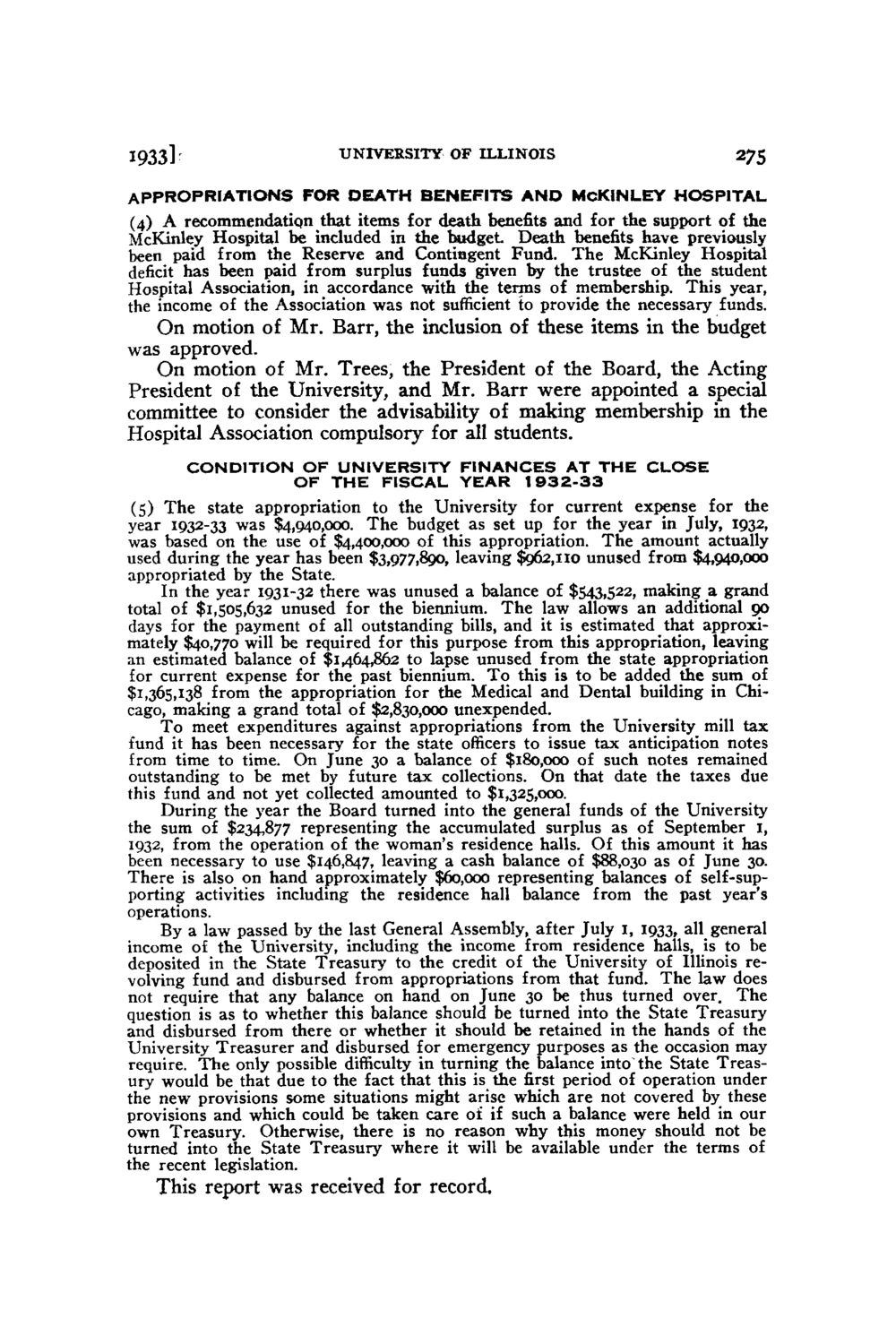| |
| |
Caption: Board of Trustees Minutes - 1934
This is a reduced-resolution page image for fast online browsing.

EXTRACTED TEXT FROM PAGE:
19331 • UNIVERSITY OF ILLINOIS 275 APPROPRIATIONS FOR DEATH BENEFITS A N D MCKINLEY HOSPITAL (4) A recommendation that items for death benefits and for the support of the McKinley Hospital be included in the budget. Death benefits have previously been paid from the Reserve and Contingent Fund. T h e McKinley Hospital deficit has been paid from surplus funds given by the trustee of the student Hospital Association, in accordance with the terms of membership. This year, the income of the Association was not sufficient to provide the necessary funds. On motion of Mr. Barr, the inclusion of these items in the was approved. On motion of Mr. Trees, the President of the Board, the President of the University, and Mr. Barr were appointed a committee to consider the advisability of making membership Hospital Association compulsory for all students. budget Acting special in the CONDITION OF UNIVERSITY FINANCES AT T H E CLOSE OF THE FISCAL YEAR 1 9 3 2 - 3 3 (5) T h e state appropriation to the University for current expense for the year 1932-33 was $4,040,000. T h e budget as set up for the year in July, 1932, was based on the use of $4,400,000 of this appropriation. T h e amount actually used during the year has been $3,977,890, leaving $962,110 unused from $4,940,000 appropriated by the State. In the year 1931-32 there was unused a balance of $543,522, making a grand total of $1,505,632 unused for the bienniutn. T h e law allows an additional 90 days for the payment of all outstanding bills, and it is estimated that approximately $40,770 will be required for this purpose from this appropriation, leaving an estimated balance of $1464^62 to lapse unused from the state appropriation for current expense for the past biennium. T o this is to be added the sum of $1,365,138 from the appropriation for the Medical and Dental building in Chicago, making a grand total of $2,830,000 unexpended. T o meet expenditures against appropriations from the University mill tax fund it has been necessary for the state officers to issue tax anticipation notes from time to time. On June 30 a balance of $180,000 of such notes remained outstanding to be met by future tax collections. On that date the taxes due this fund and not yet collected amounted to $1,325,000. During the year the Board turned into the general funds of the University the sum of $234,877 representing the accumulated surplus as of September 1, 1932, from the operation of the woman's residence halls. Of this amount it has been necessary to use $146,847, leaving a cash balance of $88,030 as of June 30. There is also on hand approximately $60,000 representing balances of self-supporting activities including the residence hall balance from the past year's operations. By a law passed by the last General Assembly, after July I, 1933, all general income of the University, including the income from residence halls, is to be deposited in the State Treasury to the credit of the University of Illinois revolving fund and disbursed from appropriations from that fund. T h e law does not require that any balance on hand on June 30 be thus turned over. T h e question is as to whether this balance should be turned into the State Treasury and disbursed from there or whether it should be retained in the hands of the University Treasurer and disbursed for emergency purposes as the occasion may require. T h e only possible difficulty in turning the balance into" the State Treasury would be that due to the fact that this is the first period of operation under the new provisions some situations might arise which are not covered by these provisions and which could be taken care of if such a balance were held in our own Treasury. Otherwise, there is no reason why this money should not be turned into the State Treasury where it will be available under the terms of the recent legislation. This report was received for record.
| |